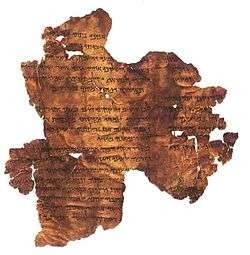Hosea 2
| Hosea 2 | |
|---|---|
 4Q166 "The Hosea Commentary Scroll", late first century B.C. | |
| Book | Book of Hosea |
| Bible part | Old Testament |
| Order in the Bible part | 28 |
| Category | Nevi'im |
Hosea 2 is the second chapter of the Book of Hosea in the Hebrew Bible or the Old Testament of the Christian Bible.[1][2] This book contains the prophecies spoken by the prophet Hosea son of Beeri, application of the symbols in the first chapter.[3] It is a part of the Book of the Twelve Minor Prophets.[4][5]
Text
- The original text is written in Hebrew language.
- This chapter is divided into 23 verses.
Textual versions
Some most ancient manuscripts containing this chapter in Hebrew language:
- Masoretic Text (10th century)
- Dead Sea Scrolls: (2nd century BC)[6][7]
- 4Q78 (4QXIIc): extant: verses 11‑13 (verses 13‑15 in Hebrew Bible)[6]
- 4Q79 (4QXIId): extant: verses 1-3 (verses 1‑5 in Hebrew Bible)[6]
- 4Q82 (4QXIIg): extant: verses 2-3, 12-17, 20-23 (verses 1-2, 4‑5, 14‑19, 22‑25 in Hebrew Bible)[6]
- 4Q166 (4QpHosa; Hosea Commentary; Pesher Hoshe`a): extant: verses 8‑14.[8][9]
Ancient translations in Koine Greek:
- Septuagint (3rd century BC)
- Theodotion version (~AD 180)
Structure
NKJV groups this chapter into:
- Hosea 2:1 = The Restoration of Israel (continuation of 1:11)
- Hosea 2:2-13 = God's Unfaithful People
- Hosea 2:14-23 = God's Mercy on His People
Verse 1
- Say ye unto your brethren, Ammi;
- and to your sisters, Ruhamah.[10]
In the two last verses of the former chapter, the prophet did from God promise marvellous mercy to Judah and Israel, to that remnant of the seed of Abraham who returned out of captivity, and to the converted Gentiles; now in this verse he calls upon them to acknowledge the mercy, and to excite one another to mutual love and esteem.[3]
Verse 23
- And I will sow her unto me in the earth;
- and I will have mercy upon her that had not obtained mercy;
- and I will say to them which were not my people,
- Thou art my people;
- and they shall say,
- Thou art my God.[11]
- "I will sow her": referring to the meaning of Jezreel (Hosea 2:22).[3] Such is the prophet's pictorial representation of a prosperity including food in abundance, refreshment limited by moderation, and even luxuries without stint. Old things are passed away; sinful things have ceased; there is a complete reversal of the sorrowful circumstances into which sin had plunged Israel. God's scattering has now become God's sowing. "I sow her" is the remark of Aben Ezra, "that they may multiply and be fruitful as the seed of the earth." The unpitied one has found mercy; the rejected one is received with rejoicing.[12]
- "On her that had not obtained mercy": or "upon Loruhamah", or the people of Israel, signified by her, Hosea 1:6 and also the Gentiles, for to both Jews and Gentiles the apostle applies the words in Romans 9:24 and they were fulfilled in part in his time, by the conversion of some of the Jews, and by the calling of the Gentiles; but will have a larger accomplishment in the latter day, when all Israel shall obtain mercy, and be saved; see Romans 11:26 and are applicable to the people of God at all times, when called by grace.[13]
- "To them which were not my people": or "to Loammi", the people of Israel, signified by the prophet's child of that name, Hosea 1:9, who should no more be called so, but "Ammi", my people, Hosea 2:1.[13]
- "And they shall say, Thou art my God": (or rather, "shall say, my God") There seems to be more affectionateness in the brief answer, which sums up the whole relation of the creature to the Creator in that one word, "Elohai, my God." The prophet declares, as before, that, when God thus anew called them His people, they by His grace would obey His call, and surrender themselves wholly to Him. For to say, "my God," is to own an exclusive relation to God alone.[14]
See also
Notes and references
- ↑ Collins 2014.
- ↑ Hayes 2015.
- 1 2 3 Robert Jamieson, Andrew Robert Fausset; David Brown. Jamieson, Fausset, and Brown's Commentary On the Whole Bible. 1871.

- ↑ Metzger, Bruce M., et al. The Oxford Companion to the Bible. New York: Oxford University Press, 1993.
- ↑ Keck, Leander E. 1996. The New Interpreter's Bible: Volume: VII. Nashville: Abingdon.
- 1 2 3 4 Dead sea scrolls - Hosea
- ↑ Timothy A. J. Jull; Douglas J. Donahue; Magen Broshi; Emanuel Tov (1995). "Radiocarbon Dating of Scrolls and Linen Fragments from the Judean Desert". Radiocarbon. 38 (1): 14. Retrieved 26 November 2014.
- ↑ Hosea Commentary. Pesher Hoshe`a. Deadsea Scrolls Exhibit
- ↑ Dead Sea scrolls/4Q166
- ↑ Hosea 2:1
- ↑ Hosea 2:23
- ↑ Joseph S. Exell; Henry Donald Maurice Spence-Jones (Editors). The Pulpit Commentary. 23 volumes. First publication: 1890.

- 1 2 John Gill. John Gill's Exposition of the Entire Bible. Exposition of the Old and New Testament. Published in 1746-1763.

- ↑ Barnes, Albert. Notes on the Old Testament. London, Blackie & Son, 1884. Reprint, Grand Rapids: Baker Books, 1998.

Bibliography
- Collins, John J. (2014). Introduction to the Hebrew Scriptures. Fortress Press.
- Hayes, Christine (2015). Introduction to the Bible. Yale University Press.